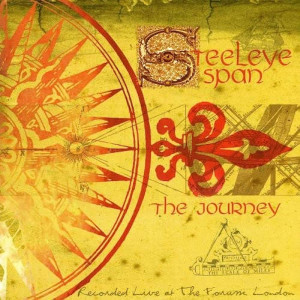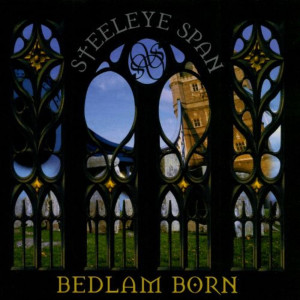Steeleye Span is a British institution, like warm beer, “chips” with vinegar, or wet shoes. They have influenced generations of young would-be folk rockers, and have been home to some of Celtdom’s best musicians. Their ranks have spawned such bands as The Albion Band, Brass Monkey, The Woods Band and The Pogues. Needless to say, musicians have come and gone at a sometimes alarming rate – though not anywhere as regularly as Steeleye’s parent band Fairport Convention.
Changes began once more in early 1999, with the departure of longest standing member and front woman Maddy Prior (who many regarded as the voice of Steeleye Span). Prior left after one fine album (1996’s Time), where she shared vocals with Gay Woods, who was returning after a twenty year absence. Drummer Liam Genockey also left the band at this time. Woods fronted the remaining band for the 1999 album Horkstow Grange, an uneven but satisfying affair. The millennium version of Steeleye Span sees the departure of another long time comrade, guitarist and songwriter Bob Johnson; and thus the deck has been shuffled once more.
Get out your trading cards, sports fans: bassist Tim Harries has moved over to electric guitar, Fairport drummer Dave Mattacks has moved permanently into the band and one time bassist (and Maddy Prior’s husband) Rick Kemp has returned … but only on the current tour, not on the new album. Confused? Well, at least Woods is still performing on lead vocals and longtime fiddle player Peter Knight has stayed put. The good news is that Bedlam Born, though obviously a transitional album, is still their best effort in years. For the record, Johnson is on the album, but as a much reduced presence, while Woods, Harries and Knight were already taking the reins.
The album’s opener shows the band that would have been with the Horkstow Grange lineup augmented by the rock solid drumming of Mattacks, slashing through “Well Done Liar!” written and sung by Johnson. This same lineup returns for the stately “Who Told The Butcher, “sung and written by Knight, which successfully mines imagery from numerous traditional sources to tell a tale of the town’s most well informed member. For “John of Ditchford” Tim Harries leads the new Johnson-less transitional lineup with a Jethro Tull-esque arrangement. The tune features Harries singing lead vocals (on a song he penned) while doubling on phased, fuzzed lead guitar and very Dave Pegg-like bass guitar.
Interestingly enough, Gay Woods does not take lead vocals until the fourth song (though she does contribute some fine backing and harmony vocals throughout.) “I See His Blood Upon The Rose” is adapted from verse by English poet Jon Plunkett (1887-1916) and is a staggering piece of dark, brooding melancholy, especially with the arrangement by Harries and Woods. Woods’ voice is at it’s purest in years, with vocals that are reminiscent of her youthful days with The Woods Band, and indeed Steeleye Span. On this album Woods takes full reigns as vocalist and it is a welcome addition.
“Black Swan” is a dandy classically influenced instrumental addition to Steeleye’s repertoire. On this tune Knight’s graceful, fiddle is enveloped in the swirling colors of Harries‚ keyboards, lending the tune a very Ric (Fairport) Sanders type feel. “The Beggar” is a exceptional little traditional song that many a folk rock band has covered, here given a nice squirmy Johnson guitar arrangement and a one-two punch by Mattacks and Harries. Peter Knight seems to be filling in a lot of the vocal chores normally performed by Johnson and it is wonderful to hear his voice build in confidence as the album progresses. Knight, who sang on the previous song, also takes lead vocal on “Poor Old Soldier,” a self penned anti-war dirge, that’s sure to eventually be given the ultimate compliment and be mistaken for a traditional song.
Gay Woods returns to the lead on the next couple of tunes starting with “Arbour,” which successfully mixes a spoken word intro with a trance-like musical arrangement and lyrics inspired from a dream about Carl Jung. Woods and Harries share vocals on the morality tale of “There Was A Wealthy Merchant,” yet another variant on the Celtic/Appalachian “Jack O’Roo/Jack O’Diamonds” tune. More stately fair is presented with “Beyond The Dreaming,” a Knight/Woods composition, featuring a beautiful Octave electric violin solo from Knight. Once again Harries takes the lead (proving to be a very engaging vocalist, interestingly, in the Bob Johnson style) on the A.L. Lloyd inspired tale of “We Poor Labouring Men.”
Late in the album is “Stephen,” an adaptation of a Child ballad sung and arranged by Harries and telling a classic Biblical tale. The two major high points of the recording are typically Woods affairs. “The Connemara Cradle Song” pairs a Delia Murphy lyric with the traditional tune “Down in the Valley,” providing a lovely, lilting bed for Woods’ Irish inflections. The much covered “White Cliffs of Dover” is taken from the usual WWII cabaret arrangement, and is given a suitably tradition inspired tune that reinforces the stark beauty of the song. This closer is a perfect ending for an album that hails the thankful rebirth of one of folk rock’s most celebrated bands.
 The Journey is a 2 CD set that chronicles an extraordinary one off reunion concert of nearly the entire cast of characters that had made up Steeleye’s 25 year history. Enticed by the prospect that the show would be a benefit for England’s War Child charity that helps kids in war torn countries, all but Pogue Terry Woods returned to perform a chronological look at Steeleye Span’s past.
The Journey is a 2 CD set that chronicles an extraordinary one off reunion concert of nearly the entire cast of characters that had made up Steeleye’s 25 year history. Enticed by the prospect that the show would be a benefit for England’s War Child charity that helps kids in war torn countries, all but Pogue Terry Woods returned to perform a chronological look at Steeleye Span’s past.
From the CD’s opener, an a capella rendition of “Calling On Song,” the chill quotient is suitably raised as Maddy Prior, Tim Hart, Martin Carthy, Ashley Hutchings and Gay Woods raise their voices together for the first time in over twenty years. Steeleye Span “Mark One” featured the aforementioned musicians, augmented by original drummer Michael Gregory on some of their finest tunes. “Blacksmith” sports a rousing duet by Prior and Woods, as does “Fisherman’s Wife,” while “Dark Eyed Sailor” has Woods taking the lead and proving the years have been kind to her lovely voice.
Accordionist extraordinaire John Kirkpatrick waltzes into the band during “Fisherman’s Wife,” (thus technically making it the “Mark One and a half lineup) and providing an excellent foil to Martin Carthy’s now rare but much welcomed electric guitar playing. The long absent and much missed Tim Hart takes the lead with a cracking good version of “Blackleg Miner,” which also sees Carthy on banjo. Woods concludes the first set with a stunning version of “The Lowlands of Holland,” which has since become a staple of the Steeleye’s second Woods led era (Mark Seven?). Fiddler Peter Knight joins the crew as Woods departs, for a five song look at Steeleye Mark Two. Carthy takes lead vocals on “Cold Haily Windy Night” and it is nothing less than a thrill to once again hear him fronting a fully electric band. Prior contributes signature renditions of “Prince Charlie Stewart” and beautifully shared vocals with Carthy on “Lark in the Morning.” Tim Hart and the boys contribute some fine vocals evoking Yuletide on the “Gower Wassail,” and a spirited set of jigs and reels round off the set. Perhaps the most surprising part of this early regrouping of the band is what an expressive and powerful bass player Ashley Hutchings can be, a fact oddly not as evident in his long time and perennial group The Albion Band.
Mark Three sees major lineup changes with Carthy, Kirkpatrick, and Hutchings leaving and guitarist Bob Johnson, bassist Rick Kemp and drummer Nigel Pegrum joining Prior, Hart and Knight for what was the band’s most commercially successful lineups. Most of the favorites are here including “Cam Ye O’er Frae France,” “John Barleycorn,” “Edward” and the inevitable “All Around My Hat.”
Disk Two begins with Steeleye Mark Four, featuring a wonderful but short lived lineup of Prior, Carthy, Kirkpatrick, Kemp, Pegrum and occasionally Hart, which was thankfully captured during the time on the Live At Last album. Here they perform a short set of “Wife of a Soldier,” “The Maid & The Palmer” and “Sweep Chimney Sweep.” From this time period through the present Steeleye went through numerous lineup changes as existing members Hart, Carthy and Bob Johnson came and went from roughly the Sails of Silver period (1980) to the Tempted and Tried album (1989). Unfortunately little of the music of this period was performed that night, though it was still a fruitful time.
The evening finished up with what was being called Mark Five featuring the then current lineup of Prior, Knight, Johnson, bassist Tim Harries and drummer Liam Genockey. Gay Woods, though not yet officially returned to the fold, joined the band on the final set of five tunes, including “Twa Corbies,” taking the lead on “The Water Is Wide,” Bob Johnson’s “Elf Knight,” and a fiery “Thomas The Rhymer.”
The required encore brought back the current band with all guests in tow, for a mesmerizing a capella rendition of “Rave On,” before launching into a blazing set of reels including “The Lark in the Morning,” and “Mason’s Apron.” Needless to say, a good time was had by all, including the very enthusiastic audience.
This two CD set and lavishly illustrated accompanying booklet preserve the event in all its glory. The liner notes tell how the whole affair was miraculously pulled together and a group history is included in case you’re as confused as most. The one major disappointment is that Park Records has no plans to release it in the States, which means stateside types are forced to buy it domestically (if you can find it) as a pricey import, or you need to search the net and pay overseas mailing fees and exchange rates. Is it worth the effort? In a word: Yes! But a few hundred well placed letters and emails to Park Records might persuade them to change their minds about a North American release.
(Park Records, 2000)
(Park Records, 1999)
GMR thanks Peter Knight for providing the review copy of The Journey.
[Update: The Journey is now available in the U.S. from the usual online sources and at least one streaming service.]

